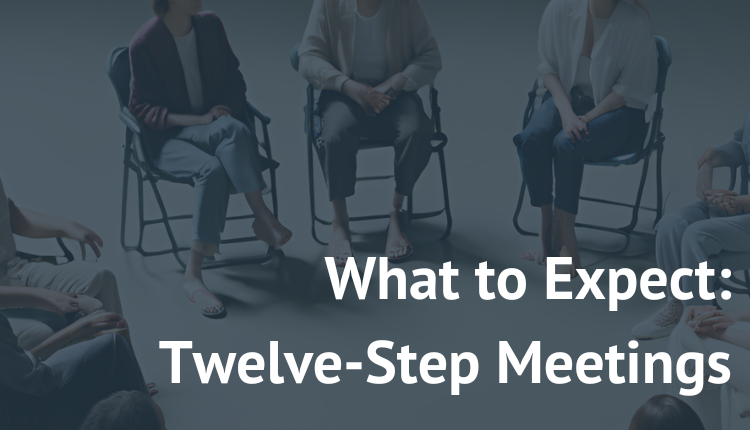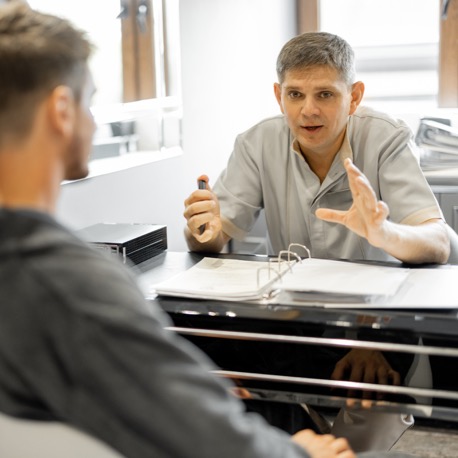Many people experiencing addiction are introduced to the concept of the Twelve Steps while in treatment, and most treatment centers strongly encourage Twelve Step meeting attendance to clients upon release. Twelve Step programs, their meetings, and their fellowships can be incredibly important tools for individuals in recovery and their loved ones, but many people do not know what to expect. Some people only have the vaguest ideas of these programs from scenes in TV shows or movie monologues–most of which are more dramatic than realistic. Other people are intimidated by the idea of joining a group and sharing about themselves. Learning a little more about what to expect can make it easier to give these groups a try.
- What are Twelve Step Programs?
Twelve Step programs are structured sets of principles originally outlined in Alcoholics Anonymous (AA). Groups like AA, Narcotics Anonymous (NA), Cocaine Anonymous (CA), Crystal Meth Anonymous (CMA), Marijuana Anonymous (MA), Heroin Anonymous (HA), and Sex Addicts Anonymous (SAA) are made up of individuals in recovery who come together to support each other. These groups are not affiliated or underwritten by any treatment center, law enforcement department, or other organization: there are no paid psychologists or staff members at a Twelve Step meeting, there is no franchise owner, and there are no police officers on duty. They are groups of people who help each other using their individual experiences with the steps and personal insight as guidance.
The Twelve Steps offer a guide for individuals seeking recovery from addiction and a new way of living. Core concepts include recognizing powerlessness over substances, acknowledging life unmanageability due to addiction, and a willingness to change attitudes and reactions to regain control of one’s life. Self-reflection and acceptance of personal faults are central to the program, emphasizing trust, love, goodwill, and forgiveness in a new way of life.
- What Types of Meetings Are There?
There are many different Twelve Step fellowships, and you might want to acquaint yourself with more than one as you’re exploring options for your recovery. Some fellowships are specific to one substance, such as Alcoholics Anonymous or Cocaine Anonymous, whereas Narcotics Anonymous addresses addiction in general; some fellowships are even for spouses and family members of addicted people, like Al-Anon, Nar-Anon, and Adult Children of Alcoholics, just to name a few.
Meetings also vary greatly within fellowships. Some meetings are for addicts and alcoholics only, and other meetings welcome family members, support people, and spouses to come along and listen. There are men’s meetings, women’s meetings, co-ed meetings, and even LGBT meetings. There are meetings in many different languages. There are online meetings and in-person meetings. Some meeting formats feature a speaker who shares their personal story, while other meetings allow everyone to share, while others focus on reading and writing or meditation. If the first meeting you attend isn’t a perfect fit for you, try another format. Different meetings will appeal to different people. Meeting schedules can be found online, and different meeting formats are usually indicated on the schedule.
- What Happens in a Twelve Step Meeting?
Twelve Step meetings are open to everyone, irrespective of background or faith. Meetings are free, anonymous, and focused on mutual help rather than professional treatment. Attendees are encouraged to be punctual and respectful, not interrupt others, and to avoid giving unsolicited advice. Many meetings conclude with a social “meeting after the meeting,” which often includes an outing for a meal or coffee and can be a chance to build a sober network and make new friends.
- What is a sponsor?
A sponsor is a person you choose to help you work the Twelve Steps. Usually a sponsor has experience working the steps with their own sponsor, is someone who you can trust and relate to, is the same gender as you, and attends some of the meetings you attend. A sponsor helps by sharing their own experience, strength, and hope. While a sponsor is not a replacement for a therapist, doctor, lawyer, or partner, a sponsor can be an incredibly important person to have in your corner throughout your recovery. They can act as a sounding board, a voice of reason, and a trusted confidant and friend.
- Is Belief in God Required for Twelve Step Meetings?
No, belief in God is not mandatory. Twelve Step groups welcome individuals with various faith traditions and those who identify as atheists. The concept of a “higher power” doesn’t have to be a religious God; it can encompass the fellowship of Alcoholics Anonymous or Narcotics Anonymous, love, family, nature, or positive energy.
- Why Are Twelve Step Meetings Held in Churches?
Twelve Step meetings are not religiously affiliated with specific churches, even though they may meet in a church. Twelve Step meetings are often hosted in churches because many churches have empty rooms to rent throughout the week. However, you can find meetings in various locations, including schools, community centers, healthcare facilities, and addiction treatment centers.
- Are There Alternative Recovery Support Groups?
Yes, there are alternative options like SMART Recovery, LifeRing, Women for Sobriety, and Moderation Management. Some groups have religious affiliations, such as Celebrate Recovery and Jewish Alcoholics. These organizations offer different approaches to recovery.
- How Do Twelve Step Programs Help People Stay Sober?
According to a report published in NIH’s National Center for Biotechnology Information, “Beginning 12-Step participation while in treatment, especially at group meetings held at the treatment program, and 12-Step attendance at the same time that one is enrolled in specialty addiction treatment, are associated with better outcomes. In addition, consistent, early, and frequent attendance/involvement is associated with better substance use outcomes.” There are numerous peer-reviewed studies that show a correlation between 12-step participation and long-term recovery.
Twelve Step programs combine accountability, inspiration, education, and support to change individuals’ thought patterns. The group dynamic reinforces healthy thinking and behavior. Twelve Step programs often talk about “the therapeutic value of one addict helping another,” as a unique tool. Everyone in the fellowship can identify on a personal level and really understand each other.
- How Do Twelve Step Programs Help People in Intensive Outpatient Treatment?
Psychologists, psychiatrists, and addiction counselors often recommend Twelve Step groups as aftercare following in-patient addiction treatment. These programs offer ongoing support and safety. Group meetings provide a platform for sharing experiences, seeking support, and learning from others’ recovery journeys, ultimately helping individuals avoid relapse.
New Paradigm Recovery in Vienna, Virginia, encourages our clients to build strong foundations of recovery while participating in our Intensive Outpatient Program (IOP) and our outpatient program (OP). We believe in a holistic approach to addiction treatment which includes the peer support and positive social and spiritual atmospheres offered in Twelve Step Programs. In fact, the founders of New Paradigm Recovery personally participate in Twelve Step Programs as vital parts of their own balanced lives in recovery. Their experience helps guide the recovery philosophy we share with our clients.
Find In-Person and Online Twelve Step Meetings in Northern Virginia
Alcoholics Anonymous Meetings in Northern Virginia
Narcotic Anonymous Meetings in Northern Virginia and the DC-region
Al-Anon Meetings in Northern Virginia
Learn more about popular Twelve Step Fellowships
This is AA: An Introduction to the AA Program
An Introductory Guide to Narcotics Anonymous, Revised
What is C.A.?

